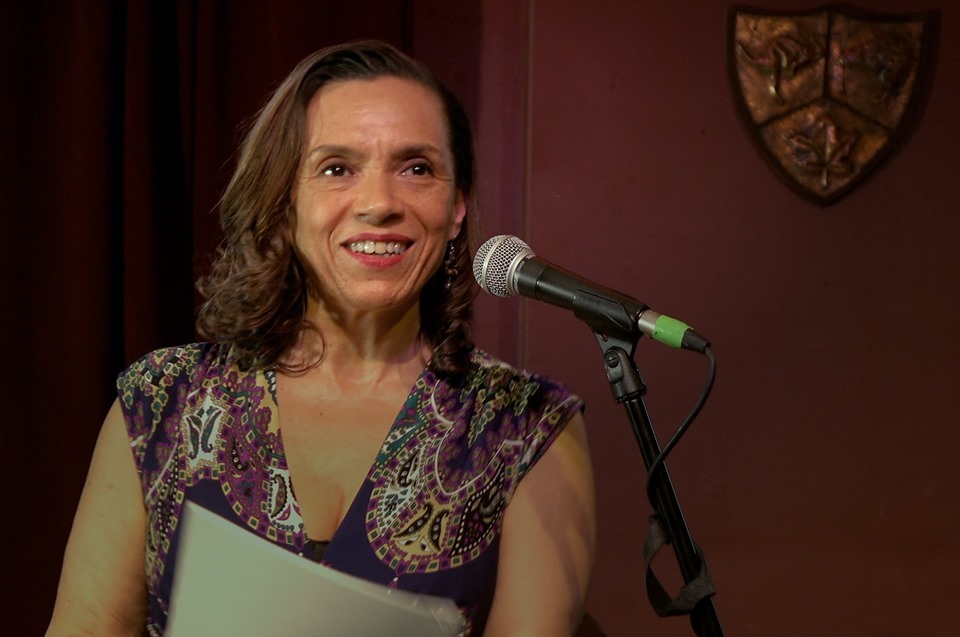Award-winning spoken word poet, author, educator, and self-described “new Christian” Andrea Thompson has been sharing her voice with the masses for 25 years. Throughout that time, Thompson has always used her talents to explore the human condition. Her lived experiences inspire themes of kindness, trauma, family, and social justice in her art.
Her latest recording, The Good Word, follows that same pattern and explores her connection to faith as it relates to the Black Canadian community. Thompson takes us on a journey of soulful melodies anchored in classic Black spirituals, blues and jazz, with the competent musical assistance of composer Evren Oz.
Although she would be too humble to call herself a natural singer, on The Good Word, Thompson’s voice becomes an instrument, interspersing song with wordcraft. This audible arc of Black faith, beginning with an “Ode to Harriet Tubman,” is a signifier of new beginnings in a freer, yet not carefree, Canada. The two adults on the album cover are her great-grandmother and great-grandfather. She also dedicated a track to her great-great-grandfather.
“I’d already been exploring Black history a lot in terms of its influence on spoken word for my last album A Selective History of Soul Speak,” says Thompson of the inspiration for the new album. “After a profound transformational spiritual experience five years ago, I became a Christian. So a question I wanted to answer for myself was — what relationship does Christianity have to the Black identity?”
To answer this, Thompson researched the relationship between the Black community, Christianity, and gospel music in The Americas. The question of Christianity’s impact on Black identity is a fair one, considering that Black people, from enslavement to the civil rights era, have found resilience in the community provided by the Black church. Thompson, who is of mixed parentage (Black father and white mother), found that the Black side of her family germinated her early relationship to faith.
“This is a bit like a coming-out album for me because, you know, I had a much more fashionable approach to spirituality based on New Age practices,” says Thompson. “When I was a kid, I thought that Christianity was really for unenlightened, unintelligent people, and didn’t really connect with faith until I had that profound experience.” Thompson will elusively mention this experience a few times, going so far as to compare it to “being shown the sun for the first time.”
More on Broadview:
- Dr. Chika Stacy Oriuwa is standing up for racialized people in health care
- In ‘Rehearsals for Living,’ two writers envision a path to a more just future
- Canadian rapper Cadence Weapon is saying what others have left unsaid
Her literal “come to Jesus moment” happened when she was at her lowest. The precarity of housing, managing grief over the deaths of close family, an abusive relationship, and the challenges of managing a childhood trauma brought her to the brink. “I went to a sleep clinic because I couldn’t sleep, and that’s where I got this diagnosis of complex PTSD,” says Thompson. “From the way my brain was firing, they could see a trauma response affecting my sleep. It was at that point where I just gave my life to God because I had nothing left to give.” A supportive phone conversation with her father, a devout Christian, helped seal the deal.
Recognizing that there are those in the Black community who view Christianity as a tool of enslavement and colonization, Thompson is quick to point out what she sees as popular misconceptions connecting white supremacy to Christianity. “Dr. Martin Luther King’s doctorate was like a sidebar to his main mission, which was as a reverend, and that seems to be kind of disappearing through a reconstruction of his legacy,” she says. She explored these misconceptions in her research, and addresses the topic on her album. “Even the concept of Christianity being spread out of Europe isn’t factual, considering its birthplace was on the crest of Africa, and Africans adopted it pre-colonization. History allows people with certain perspectives to massage the outcomes to fit their thesis, and if your thesis is Christians have done terrible things so Christians are terrible – well, that’s an unfair characterization.
Thompson had this to offer regarding the question of allyship and responsibility.
“I think as human beings, we have a responsibility to respond to the calling our faith or conscience puts on our life. I believe we can all do good here, but I’m a little reluctant to put a to-do list on somebody else when I’ve got my own to-do list to worry about.”
***
Byron Armstrong is an award-winning freelance journalist who investigates the intersections between arts and culture, lifestyle, and politics.















